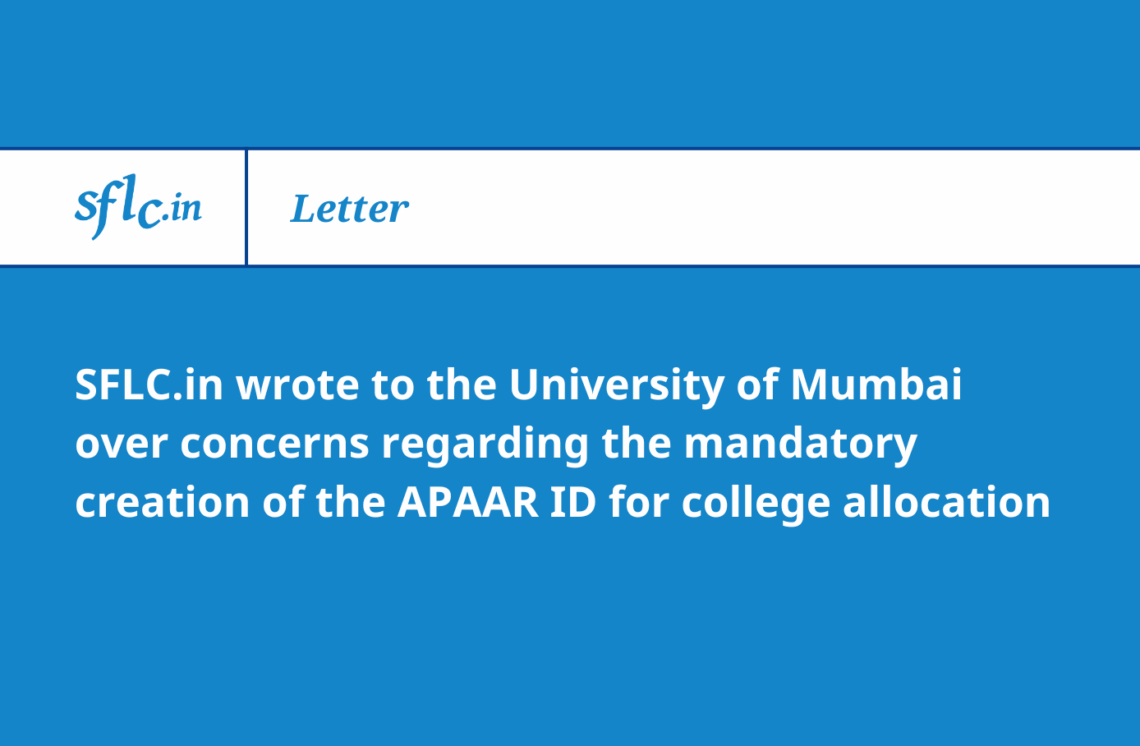SFLC.in wrote to the University of Mumbai regarding concerns about the ongoing college admission process, where APAAR ID has become mandatory for the college allocation process. Making APAAR mandatory for admission goes against the Ministry of Education’s stand that APAAR is voluntary.
As the APAAR ID presently depends solely on possession of an Aadhaar number, this requirement risks excluding students who do not have an Aadhaar. This practice also raises serious apprehensions about the potential misuse of children’s data.
Aadhaar, being the sole basis for the creation of APAAR ID, contradicts the Supreme Court’s judgement in Justice K.S. Puttaswamy and Anr. vs. Union of India (2019) as it restricts students without Aadhaar access to benefits.
Read the full letter here:
To,
The Vice Chancellor
Mumbai University
Mahatma Gandhi Road, Mantralaya, Fort, Mumbai, Maharashtra 400032
Date: 4 June, 2025
Subject: Concern regarding mandatory creation of APAAR ID for college allocation by Mumbai University despite clarification by Ministry of Education that enrolment is voluntary
Respected Sir,
We write this letter to express our concerns regarding the recent communication from Mumbai University mandating students and parents to enroll for an Automated Permanent Academic Account Registry (APAAR ID) in order to participate in the college allocation process. Importantly, the furnishing of APAAR ID was voluntary at the time of submitting applications for the entrance exams conducted. However, now, during the allotment of colleges, students have been asked to submit their APAAR ID’s. Without sharing the APAAR ID in the application for college allotment, there is no way to get admission. This communication has come in complete disregard of the voluntary nature of APAAR ID as affirmed by the Ministry of Education.
Numerous instances have emerged about the forceful signing of the consent form attached to the APAAR ID form by the parents and students to enrol under the APAAR ID. This practice also raises serious apprehensions about the potential misuse of childrens’ data. Our concerns about linking APAAR ID with Aadhaar are further amplified in light of several reported Aadhaar data breaches.
The Ministry of Education has clarified that creating an APAAR ID is voluntary in nature in its reply dated 04.12.2024 in Parliament in response to a question on APAAR ID. Further, as per the RTI application dated 16.12.2024 filed by SFLC.in on the use of APAAR ID by the Ministry of Education, the Ministry has clarified that APAAR ID is not mandatory for any child and no adverse consequences will arise for students who do not provide consent for APAAR ID.
Further, the Circular dated 05/09/2018 issued by the Unique Identification Authority of India (UIDAI) states that “it must be ensured that no children are deprived/denied of their due benefits or rights for want of Aadhaar.” The Supreme Court in Justice K.S. Puttaswamy and Anr. vs. Union of India held that no child should be denied the right to education, including admission and other facilities for lack of Aadhaar. Aadhaar, being the sole basis for the creation of APAAR ID, violates the above-mentioned Circular and contradicts the Supreme Court’s judgement as it restricts students without Aadhaar access to benefits.
In consideration of the above, we respectfully urge your esteemed institution to:
- Reiterate to students and parents that APAAR ID enrollment is voluntary and not mandatory.
- Ensure that no coercive practices or deadlines are imposed for APAAR ID creation.
- Ensure that no adverse consequences arise for students who refuse to enrol for APAAR ID.
- Ensure that students can participate in the college allocation process without furnishing APAAR ID details.
- Communicate strict data protection measures and ensure transparency in how student data is collected, stored, and used.
- Establish a clear and accessible mechanism for withdrawing consent for APAAR ID enrollment, ensuring that students and parents can opt-out without any adverse consequences.
We trust that Mumbai University will take prompt action to address these concerns, ensuring compliance with legal principles and inclusivity for all students.
Thank you for your attention to this matter. We look forward to your response.
Regards,
Thanking you,
SFLC.in




